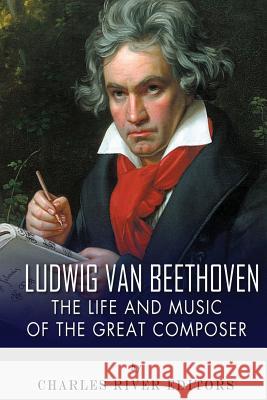Ludwig van Beethoven: The Life and Music of the Great Composer » książka
Ludwig van Beethoven: The Life and Music of the Great Composer
ISBN-13: 9781493567560 / Angielski / Miękka / 2013 / 48 str.
*Analyzes the themes and progression of Beethoven's most famous works, comparing and contrasting them to each other and other composers' great works.
*Includes pictures of important people and places in Beethoven's life.
*Includes a bibliography for further reading.
*Includes a list of Beethoven's works.
"Don't only practise your art, but force your way into its secrets; art deserves that, for it and knowledge can raise man to the Divine." - Beethoven
Among all of history's greatest musicians, few have been as admired or influential as Ludwig van Beethoven, whose name remains synonymous with composing. Works like his Fifth and Ninth symphonies remain instantly recognizable over 200 years after they were composed, and their sweeping and grandiose nature are made all the more amazing by the fact that their author was gradually going deaf and couldn't hear music very well by the time he was composing them. Similarly, the "Moonlight Sonata" and "Fur Elise" are renowned across the world and are some of the most famous piano pieces of all time.
At the same time, Beethoven's work ushered in a new era in art, helping the transition from the Classical era to the Romantic era. In the 180 years since his death, Beethoven has been enshrined by modern society as one of the most esteemed classical composers in the history of civilization, but he had a profound and immediate influence on the German musical lineage that would pass through Robert Schumann, Richard Wagner, Gustav Mahler and Richard Strauss all the way to composers of the 20th and early 21st centuries. At a time when music was very much viewed as science, Beethoven was a giant in the field, and as such he was viewed as a genius. As Beethoven himself once put it, "Music is the one incorporeal entrance into the higher world of knowledge which comprehends mankind but which mankind cannot comprehend."
In terms of assessing the essence of Beethoven's era, character or musical output, no unqualified categorization is possible, for he straddled a titanic shifting of social ideologies, performance and compositional practices, intra-continental upheavals and an emergence of the championed self in all forms of civic and artistic expressions. The ideals of the Enlightenment, an intellectual tide that swept throughout the late 18th century and opened the door to a new individualism, did not remain static through his lifetime; Beethoven was shaped by the internal and societal bent for revolutionary thought, and he was eager to play his part as a public figure in reflecting and furthering its development. Indeed, by the late Classical age, which largely deemed music a science, it came to be admitted in even academic circles that "music is the inarticulate outpouring of emotion." Such a changing state of music's relationship to society allowed what some have called Beethoven's Promethean personality to prosper in his creative work.
Ludwig van Beethoven: The Life and Music of the Great Composer comprehensively analyzes the themes and revolutionary advancements of Beethoven's music, looking at his most famous works and comparing and contrasting them. Along with pictures of important people, places, and events, you will learn about Beethoven and his music like never before, in no time at all.
"
Zawartość książki może nie spełniać oczekiwań – reklamacje nie obejmują treści, która mogła nie być redakcyjnie ani merytorycznie opracowana.











